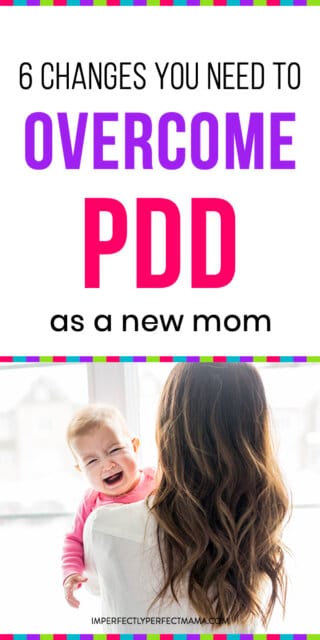**I am not a mental health professional; please don’t use this as a basis to diagnose or advise anyone. Although, these are true for me, PPD manifests differently on everyone. **

The past two years felt like a bumpy ride aboard the postpartum depression roller-coaster.
And I have to tell you, the highs were just as scary as the lows.
But I’ve learned a lot about myself. My strength was tested, and I came through.
Most especially, I learned how to cope, how to embrace being vulnerable, and how to ask for help.
Here are 6 perspective shifts I’ve had to do. I hope you find them helpful too:
1. You Have to Slow Down
While waiting for my due date, I prepared for delivery expecting to give birth vaginally without epidural.
Yeah, the fates heard me and laughed too. Because complications arose and we’ve had to take the c-section delivery route.
It was awful. I remember waking up in the middle of the operation crying because my hands were tied.
I guess I was given more sedatives because I didn’t wake up until two hours later.
And my baby was already on his way to the NICU.
I was traumatized, overwhelmed, and exhausted. I knew I should have given myself a little more time to recover.
Looking back now, I think one of the reasons I developed PPD was because I pushed myself to do too much.
I planned to go back to school during my maternity leave. We get a year where I live and I enrolled as soon as the stitches were off.
My husband works out of town and we don’t have family around to help. So I was taking care of the baby by myself.
And I was also staying up til 2am to clean the bathrooms. Why I thought that was absolutely necessary, I couldn’t tell you.
Maybe it was all early signs of PPD, I don’t know. Eventually, PPD took over. Every little thing overwhelmed me. And I’ve had to slow down – way down.
My husband had to remind me all the time, “If you only do two things today, it’s all good.”
And I’ve had to remind myself of this: “You’re not wasting time. You’re recovering.”
2. You Have to Get Comfortable Asking for Help
I know. I know. I’m a DIYer myself.
If I can give myself therapy, I would have done that too.
No wonder my husband always chides me of my inability to ask for help.
But people around you genuinely would like to help. Let them in and let them know what you need.
A friend of mine called me one day to tell me she was just diagnosed with breast cancer. She didn’t need anything from me. She just wanted me to know.
I was taken aback by the graciousness of her action. She was letting me in on a very personal and difficult journey in her life. I was and still am grateful to be part of it.
Since I know what she was going through, I was able to check in on her to offer help or support. And I am sincere on my offers. Like I know that my friends and family are sincere when they offer to help me.
So now whenever I find myself fighting not to show my own vulnerability, I think of her and her example.
3. You Have To Do the Hard Work

I was diagnosed at around 10weeks postpartum and I met with a counselor right away. She was helpful but I wasn’t receptive to help yet.
Again, maybe it was the PPD. I don’t know.
At the time, I was sure I don’t need a therapist and I can figure it out by myself.
I stopped going because I didn’t want to spend $200/session to uncomfortably unpack all my feelings of inadequacy.
Nope, not my idea of fun.
I was doing well. Coping through exercises and meditation. Yay! #selfcare
Until I wasn’t. I woke up one day and realized I was spending most days in bed. And I haven’t left the house for two months. Except for a trip or two to the grocery store.
I’ve read in one of the self-help books I was obsessing at the time that not everybody needs or benefits from therapy. And I was really, really hoping I would be one of those people. But no such luck.
Therapy is still uncomfortable and expensive, but I understand now why I need it and why it’s hard work.
4. You Might Have to Take Medications
You have to understand – really understand that PPD is not your fault.
It’s unfair. It really is. But it didn’t happen because you are lacking.
It’s a complication of giving birth and being on medication for it is the same as taking a Tylenol if you have a headache.
Personally, I didn’t want to be on medication right off the bat because I wanted to try other available interventions first. My doctor agreed, but the option was there when I need it.
The truth is, all the exercise regimen and meditation practice in the world are not going to work if you can barely get out of bed in the morning.
I’m on medications. And I’m okay with that.
I’m alive, mostly functional, and happy-ish. I like me this way.
5. You Have to Check Your Thoughts and Emotions A Lot
The wackiest thing about having depression and anxiety is not being able to trust your thoughts and feelings.
When my son wakes up in the middle of the night crying inconsolably, my first thought shouldn’t be “Oh my God! Something is very wrong. I should call 911. He’s dying!”
But it is and each time I have to reason with it.
Your anxious mind will always be thinking of scary stuff and you’d have to examine and fight them off.
When I’m feeling isolated, hopeless, or angry, I take a moment and ask myself these questions:
- Is there anything in my current situation that warrants these emotions?
- Are these all mine? Or am I just picking it up from someone?
6. You Will Need a Mindfulness Practice
Aside from therapy and medication, I credit my ability to have clear thoughts again from meditation. It was my first therapist who suggested it as a way to cope with PPD.
I use these two apps:
- MyLife. It’s a free app with an option to upgrade to premium. It offers a variety of guided meditations based on how you’re feeling.
- The Tapping Solution. EFT (Emotional Freedom Technique) or tapping is also new to me. It’s a meditation that involves tapping the acupressure points of the face and body while saying certain statements. Proponents of it believe that the movements calm the parts of the brain triggering the stress response.
Mama, doubts and exhaustion are for sure part of the motherhood contract. But the empty feeling you have when you look at your child is not.
It’s not you. You’re not okay.
Yes, parenting is hard. But it’s not supposed to be this hard. It is unfair, but there’s a way out.
Please talk to someone you trust, a doctor, or a therapist and get the help and support you need.




Leave a Reply